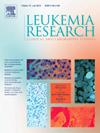Genes with altered expression by 5-Aza treatment in myeloid leukemia cells through methylation in intron 1
IF 2.2
4区 医学
Q3 HEMATOLOGY
引用次数: 0
Abstract
5-Azacitidine (5-Aza) is a hypomethylating agent with demonstrated therapeutic efficacy for myeloid leukemia. The aim of this study was to identify the genes that mediate the cell killing effect of 5-Aza against leukemia cells through their expression changes and DNA demethylation. RNA sequencing revealed 54 genes with increased transcription levels in both SKM-1 and KG-1a myeloid leukemia cell lines treated with 5-Aza. Long read sequencing revealed 79 genes in which intron 1 exhibited significant DNA demethylation after 5-Aza treatment. Forty-three genes showed both increased gene expression and DNA demethylation in intron 1 in cells treated with 5-Aza. Enrichment signaling pathway analysis demonstrated that genes were associated with “amino acid metabolism,” “neutrophil degranulation,” and “DNA damage response”. We evaluated the prognostic impacts of the 43 genes in acute myeloid leukemia patients using TCGA database. The results revealed that two genes (HDC and MICALL2) with increased expression in leukemia cells after 5-Aza treatment were associated with better overall survival, while six genes (BTG2, CD52, PECAM1, PIK3IP1, PTGS2, and TREML2) correlated with worse overall survival. This study revealed that the epigenetic regulation by DNA demethylation in intron 1 has an important role of 5-Aza treatment in myeloid leukemia cells, and suggests novel targets for the development of combination therapy with 5-Aza.
5-Aza处理通过内含子1甲基化改变髓系白血病细胞表达的基因
5-氮杂胞苷(5-Aza)是一种低甲基化药物,具有治疗髓性白血病的疗效。本研究的目的是通过5-Aza表达变化和DNA去甲基化来确定介导5-Aza对白血病细胞杀伤作用的基因。RNA测序显示,在5-Aza处理的SKM-1和KG-1a髓系白血病细胞株中,54个基因的转录水平升高。长读测序显示,在5-Aza处理后,79个基因的内含子1出现了显著的DNA去甲基化。在5-Aza处理的细胞中,43个基因在内含子1上的基因表达和DNA去甲基化都增加。富集信号通路分析表明,基因与“氨基酸代谢”、“中性粒细胞脱粒”和“DNA损伤反应”相关。我们使用TCGA数据库评估43个基因对急性髓系白血病患者预后的影响。结果显示,5-Aza治疗后,2个基因(HDC和MICALL2)在白血病细胞中表达增加与更好的总生存相关,而6个基因(BTG2、CD52、PECAM1、PIK3IP1、PTGS2和TREML2)与更差的总生存相关。本研究揭示了内含子1 DNA去甲基化的表观遗传调控在5-Aza治疗髓系白血病细胞中具有重要作用,并为开发5-Aza联合治疗提供了新的靶点。
本文章由计算机程序翻译,如有差异,请以英文原文为准。
求助全文
约1分钟内获得全文
求助全文
来源期刊

Leukemia research
医学-血液学
CiteScore
4.00
自引率
3.70%
发文量
259
审稿时长
1 months
期刊介绍:
Leukemia Research an international journal which brings comprehensive and current information to all health care professionals involved in basic and applied clinical research in hematological malignancies. The editors encourage the submission of articles relevant to hematological malignancies. The Journal scope includes reporting studies of cellular and molecular biology, genetics, immunology, epidemiology, clinical evaluation, and therapy of these diseases.
 求助内容:
求助内容: 应助结果提醒方式:
应助结果提醒方式:


